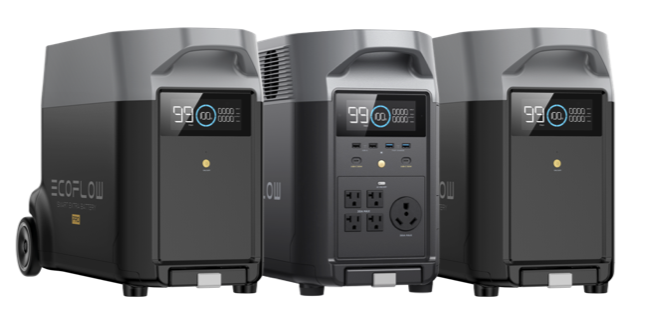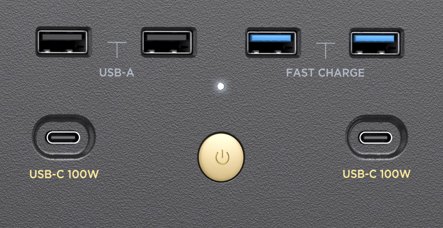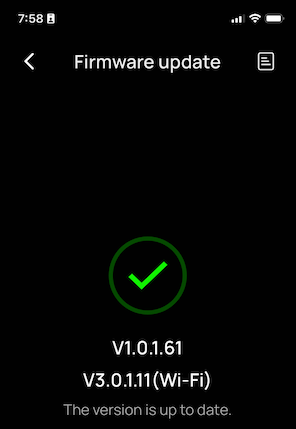Discount Code: ECOPOWER at EcoFlow.com
EcoFlow DELTA Series - Maintenance, Balance, and Recalibration
Guest writer Mark Hicks (a.k.a. EcoPower)

Maintenance
Power stations do not require the mechanical maintenance of traditional fuel generators but they do like to be "exercised" once in a while. A little attention can go a long way. The #1 rule for power station owners is: do not leave it empty. Sitting at 0% for a protracted period of time can ruin the battery! So, turn it off when not in use (unplug charging source and hold the power button until the screen says “OFF”).

Firmware
While installing every firmware update is not required there have been several changes over time (particularly for Delta Pro) that have addressed various issues such as balancing of load between the main unit and extra batteries. If you suspect imbalance or detect odd behavior when using your power station, check for updates and consider applying them. Note that for models with 2 extra battery ports you will need to rotate batteries to port 1 (if you have more than one) and repeat the firmware update as extra batteries can only update on port 1. If you have a new unit, don’t worry if firmware shows 0.1.0 (or similar) as that is the factory firmware number. If no update is offered, you are up to date!
Note: firmware updates require an internet connection over WiFi and the WiFi/Internet equipment must not be plugged into the power station during the update. Always charge to 100% and unplug everything before starting a firmware update and stay on the update screen in the app until complete (pay attention to the app, not the power station, during the update).

Storage
EcoFlow recommends 60% charge for storage (>1 month) and cycling every three (3) months. Storage over 60% will not "ruin" the battery, however, sitting at higher voltage over long periods of time does have an impact. Store in climate-controlled conditions between 20°C ~ 30°C (68°F ~ 86°F) and avoid temperatures over 45°C (113°F) or under -10°C (14°F) to preserve battery lifespan.
Cycling
Discharge to zero (0%) until it turns off, then charge to full (100%) until it stops. To preserve calibration, do this monthly when using “EPS” mode and at least every three (3) months otherwise.
Balance
Within each power station are individual cells wired together into a large battery. The same is true for smart extra batteries. These cells must operate as close as possible to the same voltage (charging and discharging together "in balance") for optimal performance. If one cell charges too fast, the others may not be full when charging stops. If one discharges too quickly, the others may not provide full output. A battery bank is only as strong as the weakest cell. A Battery Management System (BMS) governs these cells trying to keep cell voltages in balance (among other things).
Top Balancing
To aid the BMS in this “balancing act” one method is to charge to 100% and, as soon as charging stops, unplug and turn off the power station, then let it sit for several hours, overnight, or even a couple of days before turning back on again to use or discharge and store. While not always “necessary” this is a good step to consider when cycling for maintenance every 1-3 months.
Extra Batteries


The main unit and extra batteries are separate battery banks with separate BMS. While usage is centrally controlled at the main unit they may not always charge or deplete at the same rate. Apparent drift, however, may not always be what it appears because each BMS tracks its own “state of charge” (SOC) and this estimate is prone to “calibration drift”. As long as all batteries stay within ~10% of each other, this is normal.
Recalibration
The following are common symptoms that indicate a need to recalibrate (BMS reset):
- SOC jumping from 80% to 100% (or similar) when charging
- SOC stays at 99% “forever” when charging
- SOC stays at 1% “forever” when discharging
- SOC drops from 20% to 0% (or similar) when discharging
- SOC of main unit and extra batteries is more than 10% different consistently
BMS Reset
- Charge to 100% (and be ready to act immediately)
- As soon as charging stops, unplug charging source, and turn OFF
- Hold power button for 20 seconds
If the screen reads 100% (10 days / 100% for Delta Pro) after reset, you’re done!
Repeat Reset
If needed, repeat the steps above until 100% (10 days) holds after reset. If it will not take any further charge, try discharging at high rate to deplete 10%, then try the BMS Reset again.
#RiaSet
Named for Ria Jairam (Electrical Engineer and Delta Series Group Expert) the “RiaSet” combines the BMS Reset with Top Balance and tends to “fix things” most of the time.